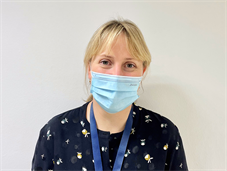Dry January with King’s Alcohol Care Team
28 January 2022 - Dr Nicky Kalk talks about about the health benefits of Dry January

As we approach the end of the month, with many people having abstained from alcohol, we spoke to Dr Nicky Kalk, a consultant addiction psychiatrist at King’s College Hospital about the health benefits of Dry January, the UK’s one-month alcohol-free challenge. Along with Dr Naina Shah, consultant hepatologist, Dr Kalk runs a clinic for people with alcohol-related liver disease here at King’s, and she is a member of the Alcohol Care Team. Dr Kalk talks about her role, how her team helps patients, and the benefits of participating in Dry January.
“My team helps to provide safe detoxification for in-patients with alcohol dependence at King’s. We also start them on anti-craving medication and link them in with community alcohol services to help them maintain abstinence from alcohol after discharge.
“I love helping patients to identify their own reasons to change their drinking habits. Stopping or cutting down on drinking when it’s a big part of your life is tough, but watching my patients make these changes – their reserves of strength, their creativity, their commitment – is just inspiring.
“Dry January is an opportunity for people to re-evaluate their relationship with alcohol. If you are wondering about the benefits and harms associated with alcohol intake, Dry January enables you to give sobriety a try and see how it feels. You may find that your sleep, mood, and anxiety levels improve substantially and you may even find you lose weight.
“Most people who drink can participate in Dry January – or Dry February, if you’re playing catch-up – safely. It’s worth preparing as you would for a diet – getting rid of the alcohol in your house, planning alternative ways of socialising if this is usually alcohol-focussed, planning alternative coping strategies for stress, or winding down of an evening. Tell your friends and family and ask them if they can support you by planning an alcohol-free activity during times you think may be tricky.
For some people, it is not safe to do Dry January: people who are dependent on alcohol and at risk of alcohol withdrawal. You may be at risk of alcohol withdrawal if:
If this is you, you need medication and medical supervision to stop drinking safely. The risks of untreated withdrawal include seizures and delirium (confusion, seeing or hearing things that aren’t there). You can get help to stop drinking if you are dependent through community alcohol services. Your GP can refer you, or you can self-refer by phoning them and asking for help.”
For further information visit Alcohol Change.
